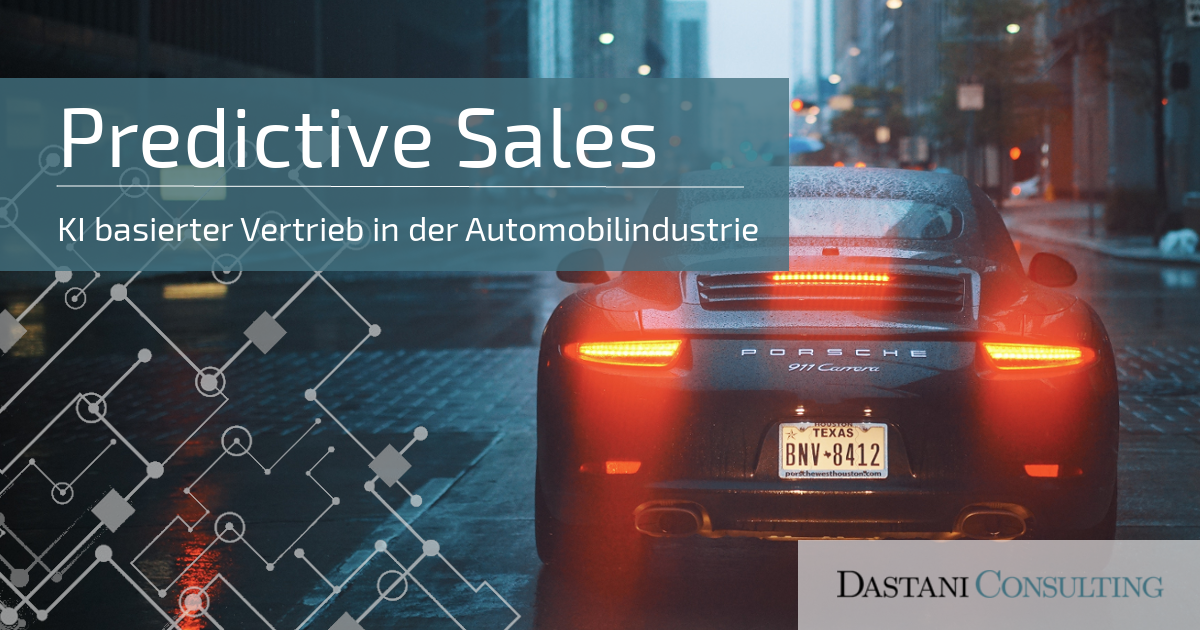
AI-controlled sales in the automotive industry
Great campaigns, masterfully deployed across all channels: Car manufacturers are unbeatable in the field of marketing. However, it is a stony path from gaining a prospective customer’s attention to actually making a sale. Artificial Intelligence (AI) deepens the customer knowledge available to sales functions and increases the probability of order completion, as it focuses on promising prospects and addresses them individually.
The VDA (Verband der Automobilindustrie / Association of Automotive Manufacturers) cites selective distribution as vehicle manufacturers’ „preferred business model“. A network of dealers, located in metropolitan areas and supplemented by manufacturers’ regional branches, maintains customer contact while the marketing function is controlled centrally by the OEMs. In addition to this, many vehicle owners rely on local auto repair service for their maintenance and repair needs. According to the industry association, the internet has „not yet become a relevant transaction medium in the new vehicle business“, but plays an important role as an information medium. This is undoubtedly an accurate description of the status quo. However, the conclusion derived from this may be a case of wishful thinking: „For passenger car sales, a network of retail establishments with good geographical coverage means regular customer contact and thus promotion of the respective brand at the personal level.“
In addition analytical balances are a critical tool in the automotive industry for ensuring accuracy and precision in the manufacturing and testing of vehicle components. These sensitive instruments are commonly used to measure and test small and precise parts, including sensors and electrical connections. They are also essential in analyzing fuel and oil samples to ensure they meet industry standards for use in vehicles. With the growing demand for vehicles that offer greater fuel efficiency and lower emissions, the use of analytical balances has become increasingly important. Manufacturers rely on these precise measurements to ensure their products meet the stringent industry regulations and standards.
Many customer contact points
True enough: Who, if not the dealership, knows the existing customers? But on the one hand, the manufacturer cannot adequately control what the dealer makes out of these contacts in terms of specifications, sales promotion programmes and incentives. And on the other hand, customers and prospects leave personal information at many other points of contact that can be transformed into valuable customer knowledge and made available to dealers – for example how a vehicle is configured on the website, or participation in a raffle initiated by a print mailing, or by interaction in social media..
These multiple touchpoints correspond to the heterogeneity of the meaningful data that is available. Technologically, we are now for the first time able to evaluate this data using Artificial Intelligence. The term „Artificial Intelligence“ was in fact coined in the middle of the last century, but until now there has not only been an insufficient volume of data but also a lack of suitable tools for its evaluation. Since the beginning of last year, it has been possible to equip virtual machines (VMs) in the Google Cloud with up to eight additional GPUs (graphics processing units), which form the core technology of AI. With the second generation of its Tensor Processing Unit (TPU), on which neural networks need much less training time than on traditional GPUs, Google has created the necessary hardware for powerful AI applications.
Determining exact sales probability
The automotive industry can capitalise on these technologies to exploit millions of addresses with artificial mega-brains. AI-driven selling is based on information from various sources available in the form of structured as well as unstructured data. Self-learning algorithms assess the sales probability based on each individual address. As a result, the sales function is able to streamline the sales process by rejecting the less promising contacts right from the start. Data from third parties, such as leasing companies, may also be included in the analysis to provide dealers with promising qualified leads.
Artificial Intelligence acts as a mediator between (potential) customers, the manufacturers and the dealer network. If, for example, centrally managed, mass-market online advertising is successful in attracting 200,000 interested prospects, this will result in perhaps 50,000 leads and at best 10,000 customers. AI tools evaluate all the information about a customer:
• How did the contact come about (call, e-mail, contact form on the website, event)?
• What kind of car does the prospect currently drive?
• How old is the prospect?
• Is the prospect male or female?
In addition to AI-driven selling, the automotive industry can also utilize technology to enhance the customer experience by offering customization options, such as personalized automotive paint for sale. By using AI algorithms to analyze customer data and preferences, car manufacturers and dealers can offer a range of colors and finishes that suit the customer’s tastes. This level of personalization can enhance the customer’s emotional attachment to their vehicle, leading to increased customer loyalty and advocacy. Furthermore, offering customization options can also provide an additional revenue stream for the automotive industry.
Approaching only the best contacts and giving them the highest level of attention – such as offering a test drive – raises the contribution margin.
Central data intelligence controls sales
Not only does AI enable companies to identify the right customers, it also tells them which consumer is interested in which product and at what point in time. The sales function is provided with valid answers to the question of who will buy which model in the next three months with which level of probability – right up to the configuration details. Consequently, the marketing department can target the glossy brochure depicting the new model series to addresses where conversion is likely. In this constellation – central data intelligence controlling decentralised distribution – the car dealership is able to do what the manufacturers demand of it: „personally promote of the respective brand“.
